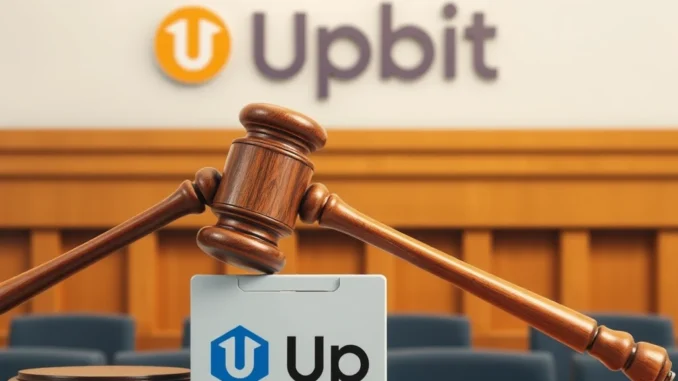
In a dramatic turn of events that has sent ripples through the South Korean cryptocurrency market, Upbit, one of the nation’s leading crypto exchanges, has secured a significant legal victory. A South Korean court has temporarily put the brakes on sanctions imposed by the country’s financial watchdog on Dunamu, Upbit’s operator. This news is a major relief for Upbit users and the broader crypto community, sparking conversations about regulatory overreach and the future of digital asset exchanges in South Korea.
Why Did the South Korean Court Intervene in Upbit’s Sanctions?
The Financial Services Commission’s Financial Intelligence Unit (FIU) had initially slapped sanctions on Upbit, including a three-month suspension of new user crypto transfers. This measure, set to run from March 7 to June 6, was triggered by allegations that Upbit had not fully complied with financial regulations. However, Dunamu swiftly contested these sanctions, arguing their validity in court. The Seoul Administrative Court, after reviewing the case, decided to grant Dunamu’s request for a temporary halt to these penalties. This interim decision essentially suspends the enforcement of the sanctions until the court makes a final ruling on the matter.
Decoding the Sanctions: What Was Upbit Accused Of?
While the specifics of the alleged financial regulation breaches haven’t been fully disclosed, it’s understood that the FIU’s sanctions stemmed from concerns regarding Upbit’s operational practices. These concerns likely revolve around areas such as:
- Anti-Money Laundering (AML) Compliance: Ensuring robust systems are in place to prevent the exchange from being used for money laundering activities.
- Know Your Customer (KYC) Procedures: Verifying the identity of users and monitoring transactions to comply with regulatory standards.
- Reporting Requirements: Meeting obligations to report suspicious transactions and activities to the relevant authorities.
The FIU, like regulatory bodies worldwide, is tasked with maintaining the integrity of the financial system and ensuring that crypto exchanges operate within established legal frameworks. The sanctions against Upbit were a clear signal of the regulator’s intent to enforce these standards within the rapidly evolving crypto space.
The Court’s Decision: A Temporary Reprieve or a Sign of Shifting Tides?
The Seoul Administrative Court’s decision to temporarily halt the sanctions is a noteworthy development for several reasons:
- Temporary Relief for Upbit: Most immediately, it allows Upbit to continue onboarding new users for crypto transfers, avoiding potential business disruptions and reputational damage during the sanction period.
- Challenging Regulatory Authority: Dunamu’s successful appeal highlights the possibility for crypto businesses to challenge regulatory decisions in court. It suggests a system of checks and balances is at play, ensuring regulatory actions are subject to judicial review.
- Implications for Crypto Regulation in South Korea: This case could set a precedent for how South Korean courts approach regulatory disputes involving crypto exchanges. It might encourage more dialogue and negotiation between regulators and the crypto industry.
However, it’s crucial to remember that this is a temporary halt. The court is yet to make a final judgment on the validity of the sanctions. The ultimate outcome will depend on the court’s assessment of the evidence presented by both the FIU and Dunamu.
Impact on Upbit and the South Korean Crypto Market
The news of the court’s intervention has been greeted with optimism within the South Korean crypto community. A prolonged suspension of new user transfers could have significantly impacted Upbit’s market share and user growth. The temporary halt provides a breathing space for Upbit to address the FIU’s concerns and present its case in court.
Moreover, this event underscores the ongoing tension between regulators seeking to control the burgeoning crypto sector and crypto businesses striving for innovation and growth. Crypto exchange sanctions are a powerful tool in the hands of regulators, and their application can have significant consequences for exchanges and the broader market.
What Does This Mean for Crypto Users and Investors?
For Dunamu and Upbit users, the immediate impact is positive. The exchange can continue operating without the restrictions on new user transfers, ensuring seamless access to crypto services. For investors, this news could be interpreted as a sign of a more balanced regulatory environment in South Korea, where legal challenges to regulatory actions are possible and can yield results.
However, uncertainty remains until the court reaches a final verdict. Crypto users and investors should closely monitor further developments in this case, as it could have implications for the regulatory landscape of crypto exchanges not just in South Korea, but potentially in other jurisdictions as well.
Looking Ahead: The Future of Crypto Regulation in South Korea
The South Korean court decision regarding Upbit’s sanctions is a critical juncture in the ongoing evolution of crypto regulation. It highlights the complexities and nuances of regulating a decentralized and rapidly changing industry. As governments worldwide grapple with how to oversee crypto, cases like Upbit’s will provide valuable lessons and shape future regulatory approaches.
Key takeaways from this situation include:
- Importance of Legal Recourse: Crypto businesses must have avenues to challenge regulatory decisions they believe are unjust or disproportionate.
- Need for Clear Regulatory Frameworks: Ambiguity in regulations can lead to disputes and uncertainty. Clear, well-defined rules are essential for both regulators and businesses.
- Balancing Innovation and Regulation: The goal should be to foster innovation in the crypto space while safeguarding consumer protection and financial stability.
In Conclusion: A Victory, But the Battle Continues
The temporary halt of sanctions against Upbit’s operator, Dunamu, is undoubtedly a victory for the exchange and a moment of relief for the South Korean crypto market. However, it is just one step in a larger, ongoing process of navigating the regulatory landscape of cryptocurrencies. The final court ruling will be crucial, and the case serves as a reminder of the dynamic and often contentious relationship between crypto innovators and regulatory authorities. As the crypto industry matures, expect to see more such legal challenges and dialogues as stakeholders seek to define the future of digital finance.



